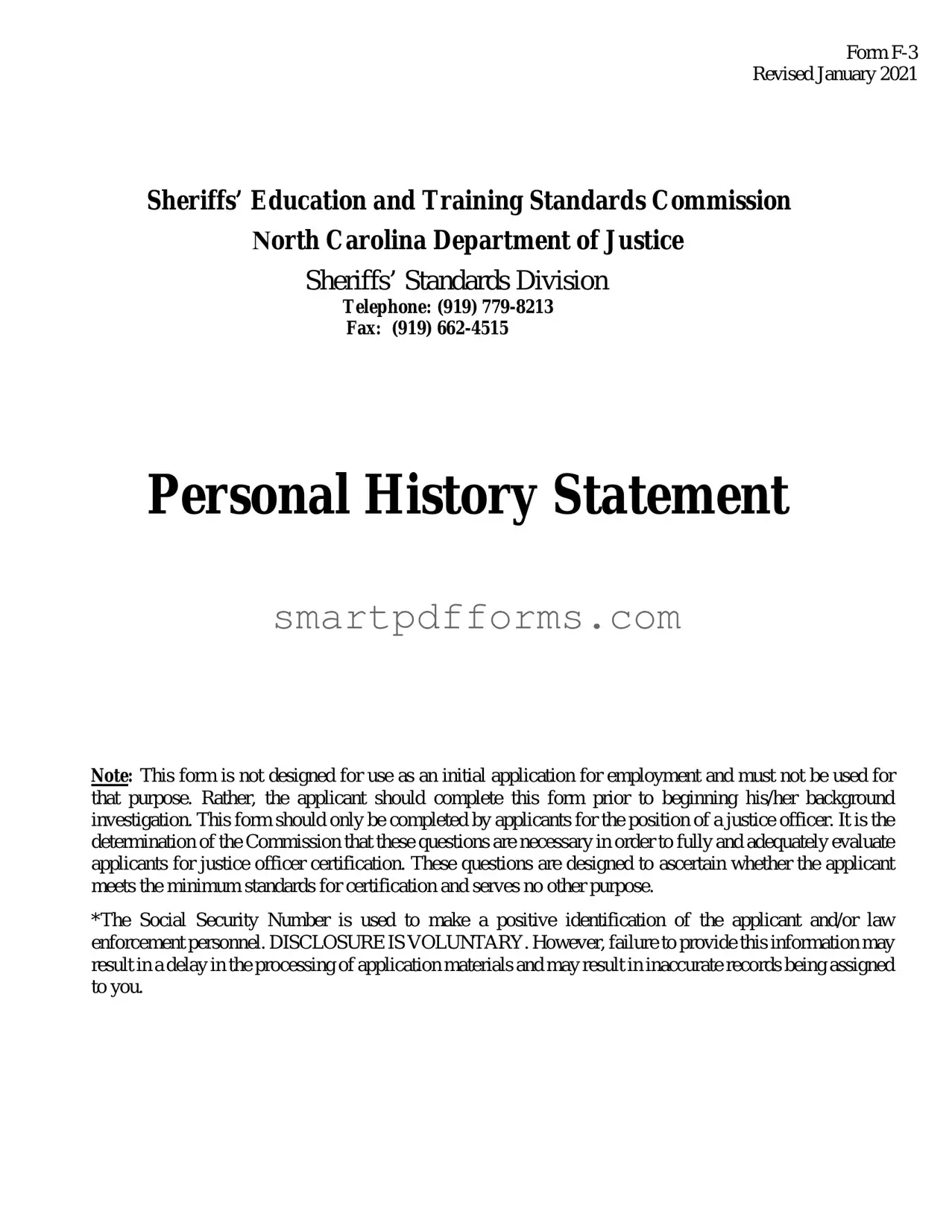Blank Nc F 3 PDF Template
In the realm of law enforcement and justice careers within North Carolina, the Form F-3, as revised in January 2021 by the Sheriffs’ Education and Training Standards Commission under the North Carolina Department of Justice Sheriffs’ Standards Division, represents a critical step for applicants eyeing positions as justice officers. This Personal History Statement is specifically tailored, not as an initial application for employment but as a precursor to the comprehensive background investigation required for such roles. Mandatory for those seeking certification as justice officers, the form's intrinsic questions are meticulously designed to ensure that applicants meet the stringent minimum standards for certification, focusing solely on this objective without serving any ancillary purposes. The form mandates thorough and accurate completion, emphasizing the necessity for honesty in disclosures, which, while pivotal, will not outright disqualify candidacies based on truthful admissions. Furthermore, the form necessitates notarization upon completion, underscoring the significance of the information provided. Applicants are prompted to detail personal information, educational background, residence history, and family data, alongside other particulars essential for a full evaluation. Encouraging voluntary disclosure of Social Security Numbers to facilitate positive identification, the form intimates potential delays or inaccuracies in application processing should this information be withheld. As such, the F-3 form stands as a vital tool in the meticulous process of vetting candidates for justice officer positions within the state, mirroring both the elevated expectations and the thorough scrutiny aligned with such roles.
Preview - Nc F 3 Form
Form
Revised January 2021
Sheriffs’ Education and Training Standards Commission
North Carolina Department of Justice
Sheriffs’ Standards Division
Telephone: (919)
Fax: (919)
Personal History Statement
Note: This form is not designed for use as an initial application for employment and must not be used for that purpose. Rather, the applicant should complete this form prior to beginning his/her background investigation. This form should only be completed by applicants for the position of a justice officer. It is the determination of the Commission that these questions are necessary in order to fully and adequately evaluate applicants for justice officer certification. These questions are designed to ascertain whether the applicant meets the minimum standards for certification and serves no other purpose.
*The Social Security Number is used to make a positive identification of the applicant and/or law enforcement personnel. DISCLOSURE IS VOLUNTARY. However, failure to provide this information may result in a delay in the processing of application materials and may result in inaccurate records being assigned to you.

FORM
NORTH CAROLINA SHERIFFS' EDUCATION AND TRAINING STANDARDS COMMISSION
PERSONAL HISTORY STATEMENT
INSTRUCTIONS: Fill out this form completely and accurately. If you need extra space, add additional pages and identify the information by item number. All questions must be answered.
NOTE: Any statements are subject to validation and any incorrect statements or omissions may disqualify you from certification. Truthful statements to any item requested will not necessarily exclude you from consideration. This form must be notarized upon completion.
POSITION(S) APPLIED FOR:
Agency |
|
|
Date |
Deputy |
Detention Officer |
Telecommunicator |
|
Have you previously submitted an application for employment with this agency? |
Yes |
No |
|||||||
If YES, approximate date: |
|
|
|
|
|
|
|
|
|
PERSONAL |
|
|
|
|
|
|
|
||
1. Name: |
|
|
|
|
|
|
|
||
|
First |
|
|
Middle |
|
|
|
Last |
|
Maiden Name
Other previous last names:
Nicknames or Aliases
Note: If your name was legally changed after the age of 12, please submit documentation showing when that occurred.
2. Social Security |
|
|
|
|
|
|
|
|
|
|
|
|
|
|
|
|
|
|
|
|
|
|||||
3. Present Mailing Address: |
|
|
|
Permanent Mailing Address |
|
|
||||||||||||||||||||
|
Street and Number |
|
|
|
|
Street and Number |
|
|
|
|
|
|
||||||||||||||
|
|
|
|
|
|
|
|
|
|
|
|
|
|
|
|
|
|
|
|
|
|
|
|
|
|
|
|
City |
|
|
|
|
|
|
|
|
|
City |
|
|
|
|
|
|
|
||||||||
|
State |
|
|
Zip Code |
|
|
|
|
State |
Zip Code |
|
|
||||||||||||||
|
|
|
|
|
|
|
|
|
|
|
|
|
|
|
|
|
|
|
|
|
|
|
||||
Telephone Numbers: |
|
|
|
|
|
|
|
|
|
|
|
|
|
|
|
|
||||||||||
|
Home: |
|
|
|
|
|
|
|
|
|
Work: |
|
|
|
|
|
|
|
||||||||
|
Pager: |
|
|
|
|
|
|
|
|
|
|
|
|
|
|
|
||||||||||
|
Cell/Mobile |
|
|
|
|
|
|
|
|
|
|
|
|
|
|
|
|
|
|
|
|
|
||||
|
|
|
|
|
|
|
|
|
|
|
|
|
|
|
|
|
|
|
|
|
||||||
4a. Date of Birth: |
|
|
|
|
|
4b. Place of Birth: |
|
|
|
|
|
|
||||||||||||||
|
|
|
|
|
|
|
|
|
|
|
|
|
|
|
|
|
|
|
|
|
(City/State/Country) |
|
|
|||
5. Citizenship: |
☐ U.S. Born ☐ U.S. Naturalized |
|
☐ Other, specify: |
|
|
|
|
|
|
|||||||||||||||||
|
|
|
|
|
|
|
|
|
|
|
1 |
|
|
|
|
|
|
|
|
|
|
|
|
|
|
|

Note: |
Data solicited in questions 6 and 7 will be utilized for equal employment statistical |
|
information purposes only |
6. |
Ethnicity: |
African American |
Asian American |
7. |
Gender: |
Male |
Female |
8.Do you object to wearing a uniform?
9.Do you object to working nights?
10. Do you object to working rotating shifts?
Hispanic |
Caucasian |
Other: |
|
|
|
Yes |
No |
Yes |
No |
Yes |
No |
11. Do you object to occasionally being away from home overnight and/or for other periods of time to attend
meetings, acquire training or otherwise perform official duties? |
☐ Yes |
☐ No |
EDUCATIONAL
12.Indicate the type of High School you attended:
Traditional ☐ Home School ☐ GED ☐
Distance Learning ☐
Did not attend high school ☐
Other: ____________________________
A. High Schools:
NAME: |
WHEN ATTENDED: |
||
|
|
|
|
CITY: |
GRADUATED: |
||
|
|
|
|
STATE: |
DEGREE AWARDED: |
||
|
|
|
|
YEARS COMPLETED: |
MAJOR FIELD: |
||
|
|
|
|
NAME: |
WHEN ATTENDED: |
||
|
|
|
|
CITY: |
GRADUATED: |
||
|
|
|
|
STATE: |
DEGREE AWARDED: |
||
|
|
|
|
YEARS COMPLETED: |
MAJOR FIELD: |
||
|
|
|
|
B. University or Colleges:
NAME: |
WHEN ATTENDED: |
||
|
|
|
|
CITY: |
GRADUATED: |
||
|
|
|
|
STATE: |
DEGREE AWARDED: |
||
|
|
|
|
YEARS COMPLETED: |
MAJOR FIELD: |
||
|
|
|
|
NAME: |
WHEN ATTENDED: |
||
|
|
|
|
CITY: |
GRADUATED: |
||
|
|
|
|
STATE: |
DEGREE AWARDED: |
||
|
|
|
|
YEARS COMPLETED: |
MAJOR FIELD: |
||
2

C. Continuing Education:
NAME: |
|
WHEN ATTENDED: |
||
CITY: |
|
GRADUATED: |
||
STATE: |
|
DEGREE AWARDED: |
||
YEARS COMPLETED: |
|
MAJOR FIELD: |
||
NAME: |
|
WHEN ATTENDED: |
||
CITY: |
|
GRADUATED: |
||
STATE: |
|
DEGREE AWARDED: |
||
YEARS COMPLETED: |
|
MAJOR FIELD: |
||
RESIDENCES
13. List addresses for the past 10 years starting with present address listed first:
From: To: (MM/YY) (MM/YY)
Address, City, State
County
Landlord
FAMILY HISTORY
NOTE: Questions included in the next section are intended to assist in the conducting of a background investigation and are not intended for use by the employing agency as disqualifying factors for employment as a justice officer
14. Marital Status: |
|
|
Never Married |
Married |
Divorced |
15. Name of Spouse / Former Spouse(s)
Engaged |
Separated |
Widowed
3

16. A. Do you have any children born to you, adopted by you, or stepchildren? |
Yes |
No |
B. If Yes, list all of your children below: |
|
|
(1)
(2)
(3)
(4)
(5)
(6)
Name
Birthdate
Relationship
With whom
resides
Phone Number
C. Are you now supporting all these children? |
Yes |
No |
If NO, give details: |
|
|
|
|
|
|
|
|
|
|
|
|
17. Are there persons, other than your spouse and listed children, who are presently dependent upon you
for support? |
Yes |
No |
If YES, give details: |
|
|
|
|
|
|
|
|
|
|
|
|
|
|
|
|
|
|
|
|
|
18.Are you related by blood or marriage to any person (s) now employed by this agency? If YES, give name(s) and details:
Yes
No
19. Is any member of your immediate family now in prison/jail or on probation or parole? |
☐ Yes |
☐ No |
|
If YES, give name(s) and details: |
|
|
|
|
|
|
|
|
|
|
|
|
|
|
|
4

FINANCIAL
20.What sources of income other than salary do you have at present?
21.Have you ever been sued with a civil judgment being rendered against you? Please note this includes
repossessions, evictions, executions, etc. |
Yes |
No |
If YES, explain: |
|
|
|
|
|
|
|
|
|
|
|
|
|
|
|
|
22. Have you ever declared bankruptcy? |
Yes |
No |
IF YES, explain: |
|
|
|
|
|
|
|
|
|
|
|
|
|
|
|
|
23.What is the total amount of all your debts at present?
24.What is the average monthly total of all your bills, payments, and current living expenses?
25.List credit references, including businesses to which you make monthly payments:
Firm / Business
Street Address
City / State
Amount Owing
5

WORK HISTORY
26. Have you ever been denied employment by a criminal justice agency after a conditional offer of
employment was made? |
Yes |
No |
(If Yes, list agency name and reason.) |
|||
|
|
|
|
|
|
|
|
|
|
|
|
|
|
|
|
|
|
|
|
|
27.Have you ever held a position in any capacity which required certification or licensure from any Commission, Board or Agency established to certify or license that position? (Note: List any such
Commission, Board or Agency, whether in or out of North Carolina.) |
Yes |
No |
27a. If yes, was such certification or license ever suspended, revoked, or any sanctions taken against it by
the issuing authority? |
Yes |
No |
27b. If such certification or license was ever suspended, revoked, and any sanctions taken against it by
the issuing authority, please list the agency's name taking action against the certification or license, date of action, reason for the action, and period of time for the suspension, revocation, or sanction.
28. Have you ever been discharged or requested to resign from any position because of criminal misconduct
or rules violations? |
Yes |
No (If Yes, list employer, |
|
|
|
|
|
|
|
|
|
29.List all jobs, positions or appointments you have held in the last ten years to include inactive, active, reserve, temporary,
Employer: |
|
|
Address: |
|
|
|
|
|
|
Job Title: |
|
|
Supervisor’s Name: |
Phone Number: |
|
|
|
|
|
Date Employed (MM/YY): |
|
Starting Salary: |
Ending or Current Salary: |
|
|
|
|
Per: |
Per: |
|
|
|
|
|
Date Separated (MM/YY): |
|
List Major Duties in Order of Importance: |
||
|
|
|
|
|
Full Time: |
YRS |
MOS |
|
|
|
|
|
|
|
Part Time: |
YRS |
MOS |
|
|
If part time, hours worked per week: |
|
|
||
|
|
|
|
|
Reason for Leaving: |
|
|
|
|
|
|
|
|
|
6
Employer: |
|
|
Address: |
|
|
|
|
|
|
Job Title: |
|
|
Supervisor’s Name: |
Phone Number: |
|
|
|
|
|
Date Employed (MM/YY): |
|
Starting Salary: |
Ending or Current Salary: |
|
|
|
|
Per: |
Per: |
|
|
|
|
|
Date Separated (MM/YY): |
|
List Major Duties in Order of Importance: |
||
|
|
|
|
|
Full Time: |
YRS |
MOS |
|
|
|
|
|
|
|
Part Time: |
YRS |
MOS |
|
|
If part time, hours worked per week: |
|
|
||
|
|
|
|
|
Reason for Leaving: |
|
|
|
|
|
|
|
|
|
|
|
|
|
|
Employer: |
|
|
Address: |
|
|
|
|
|
|
Job Title: |
|
|
Supervisor’s Name: |
Phone Number: |
|
|
|
|
|
Date Employed (MM/YY): |
|
Starting Salary: |
Ending or Current Salary: |
|
|
|
|
Per: |
Per: |
|
|
|
|
|
Date Separated (MM/YY): |
|
List Major Duties in Order of Importance: |
||
|
|
|
|
|
Full Time: |
YRS |
MOS |
|
|
|
|
|
|
|
Part Time: |
YRS |
MOS |
|
|
If part time, hours worked per week: |
|
|
||
|
|
|
|
|
Reason for Leaving: |
|
|
|
|
|
|
|
|
|
|
|
|
|
|
Employer: |
|
|
Address: |
|
|
|
|
|
|
Job Title: |
|
|
Supervisor’s Name: |
Phone Number: |
|
|
|
|
|
Date Employed (MM/YY): |
|
Starting Salary: |
Ending or Current Salary: |
|
|
|
|
Per: |
Per: |
|
|
|
|
|
Date Separated (MM/YY): |
|
List Major Duties in Order of Importance: |
||
|
|
|
|
|
Full Time: |
YRS |
MOS |
|
|
|
|
|
|
|
Part Time: |
YRS |
MOS |
|
|
If part time, hours worked per week: |
|
|
||
|
|
|
|
|
Reason for Leaving: |
|
|
|
|
|
|
|
|
|
7
Employer: |
|
|
Address: |
|
|
|
|
|
|
Job Title: |
|
|
Supervisor’s Name: |
Phone Number: |
|
|
|
|
|
Date Employed (MM/YY): |
|
Starting Salary: |
Ending or Current Salary: |
|
|
|
|
Per: |
Per: |
|
|
|
|
|
Date Separated (MM/YY): |
|
List Major Duties in Order of Importance: |
||
|
|
|
|
|
Full Time: |
YRS |
MOS |
|
|
|
|
|
|
|
Part Time: |
YRS |
MOS |
|
|
If part time, hours worked per week: |
|
|
||
|
|
|
|
|
Reason for Leaving: |
|
|
|
|
|
|
|
|
|
|
|
|
|
|
Employer: |
|
|
Address: |
|
|
|
|
|
|
Job Title: |
|
|
Supervisor’s Name: |
Phone Number: |
|
|
|
|
|
Date Employed (MM/YY): |
|
Starting Salary: |
Ending or Current Salary: |
|
|
|
|
Per: |
Per: |
|
|
|
|
|
Date Separated (MM/YY): |
|
List Major Duties in Order of Importance: |
||
|
|
|
|
|
Full Time: |
YRS |
MOS |
|
|
|
|
|
|
|
Part Time: |
YRS |
MOS |
|
|
If part time, hours worked per week: |
|
|
||
|
|
|
|
|
Reason for Leaving: |
|
|
|
|
|
|
|
|
|
If you need more space, attach additional sheets.
Explain periods of unemployment of three months or more, if you do not have a full
__________________________________________________________________________________________________________________________
__________________________________________________________________________________________________________________________
__________________________________________________________________________________________________________________________
__________________________________________________________________________________________________________________________
__________________________________________________________________________________________________________________________
__________________________________________________________________________________________________________________________
__________________________________________________________________________________________________________________________
__________________________________________________________________________________________________________________________
8

MILITARY SERVICE
30. Were you ever in the U.S. Military service or any other military organization? (Even if you served for
only one day, list this service.) |
Yes |
No If YES, complete #31 through #38. If NO, skip to #39. |
31.What was your service number?
32.A. What was the highest rank you held?
B.What was the last rank you held?
33.A. What was the date and location of your first enlistment and/or commission?
B.List all tours of duty where a DD214 was issued.
Branch
Date Entered
Date Released
34. List all stations of assignment including active, reserve and/or National Guard (Attach additional pages if needed.)
Branch
Unit (Company or Ship)
Location
From (MM/YY) TO (MM/YY)
35.What was the date and location of your last discharge from active duty?
36.Have you ever received any of the following types of discharge:
Uncharacterized (includes entry level separations) |
Yes |
No |
Honorable |
Yes |
No |
General (under honorable conditions) |
Yes |
No |
Under other than honorable conditions (includes undesirable) |
Yes |
No |
Bad Conduct discharge |
Yes |
No |
Dishonorable discharge |
Yes |
No |
Dismissal |
Yes |
No |
37.Were you ever court martialed, tried on charges, or the subject of a summary court, deck court,
member of the military, Nation Guard or reserve unit? |
Yes |
No |
If YES, explain what occurred and what type of punishment you received: |
||
|
|
|
|
|
|
|
|
|
38.If you are presently a member of the National Guard or any military reserve, give the unit, location, and describe your obligation, and provide your expected date of separation:
9
Form Data
| Fact | Description |
|---|---|
| 1. Form Title | North Carolina Sheriffs' Education and Training Standards Commission Personal History Statement (Form F-3) |
| 2. Revision Date | January 2021 |
| 3. Purpose | Not designed as an initial application for employment but to be completed prior to a background investigation for justice officer position applicants. |
| 4. Contact Information | Includes telephone and fax numbers for the Sheriffs' Standards Division, North Carolina Department of Justice. |
| 5. Applicant Identification | Requires personal information including Social Security Number (Disclosure is voluntary but necessary for identification). |
| 6. Background Information | Extensive questions on personal history, residency, education, and family, aimed at evaluating the applicant for certification standards. |
| 7. Employment Barriers | Questions address potential issues with wearing uniforms, working nights, or rotating shifts, and traveling for work. |
| 8. Notarization Requirement | The form must be notarized upon completion, ensuring the validity of the provided information. |
| 9. Governing Law | Guided by regulations of the North Carolina Sheriffs' Education and Training Standards Commission and applicable state law. |
Instructions on Utilizing Nc F 3
Filling out the NC F-3 form is a vital step for applicants aiming for positions as justice officers. This Personal History Statement is integral to the background investigation process and must be completed with accuracy and honesty to facilitate the evaluation for certification by the Sheriffs’ Education and Training Standards Commission of North Carolina. Prior to completing the form, applicants should gather necessary documentation and ensure they have enough time to provide detailed and accurate responses. Upon completion, the form needs to be notarized, underscoring the importance of its contents. The following instructions outline how to fill out the form step by step.
- Start by entering the position(s) applied for, including the agency and date. If you have previously applied to the agency, note the approximate date of application.
- Under the Personal section, fill in your full name, including maiden and other previous names if applicable. Include nicknames or aliases. Provide documentation if your name was legally changed after the age of 12.
- Enter your Social Security Number, acknowledging that its disclosure is voluntary but important for accurate identification.
- For your address, fill in both your present and permanent mailing addresses, including street, city, state, and zip code. Provide your contact details, including telephone numbers (home, work, pager) and email.
- Details about your birth should include your date and place of birth (city, state, country), as well as your citizenship status.
- Answer personal questions regarding ethnicity and gender—these details are used solely for statistical purposes.
- Respond to questions about your availability and willingness to wear a uniform, work nights, and rotating shifts, including if you are okay with occasional travel for work.
- Under Educational, specify the type of high school attended and provide details about high schools, universities or colleges, and any continuing education, including names, attendance dates, graduation status, degrees awarded, and fields of major.
- List all residences where you have lived in the past 10 years, starting with your current address. Provide the from and to dates (MM/YY), address, city, state, county, and landlord information.
- In the Family History section, select your marital status and provide details about your spouse or former spouses. List any children, including stepchildren or adopted children, their birthdates, relationship to you, where they reside, and their phone numbers. Clarify if you are supporting all these children or provide details if not. Mention other dependents if applicable.
- Disclose any relationships by blood or marriage to anyone employed by the agency you're applying to, detailing names and relationships.
- Indicate if any member of your immediate family is currently in prison, jail, or under probation or parole, providing names and details if applicable.
After completing these steps, remember to review your responses for accuracy and completeness. The final step involves notarizing the document, thereby affirming the truthfulness and accuracy of the information provided. This detailed and accurate completion of the NC F-3 form is essential in the evaluation process for certification as a justice officer.
Obtain Answers on Nc F 3
Below are frequently asked questions regarding the NC F-3 form, a crucial document for those applying for justice officer positions within the North Carolina Department of Justice Sheriffs’ Standards Division.
- What is the purpose of the NC F-3 form?
The NC F-3 form, also known as the Personal History Statement, is designed to gather comprehensive personal history information from applicants for justice officer positions, such as deputies, detention officers, and telecommunicators. Its purpose is not for initial employment application but to assist in the background investigation process that follows an initial employment offer. The form helps the Sheriffs’ Education and Training Standards Commission to determine whether the applicant meets the minimum standards for certification as a justice officer.
- Is disclosing my Social Security Number mandatory on the NC F-3 form?
Disclosing your Social Security Number (SSN) on the form is voluntary. However, failing to provide your SSN may lead to delays in the processing of your application and potentially result in inaccuracies in your records. The SSN is used solely for the purpose of positively identifying the applicant.
- Can any part of the NC F-3 be left incomplete?
No, all questions on the NC F-3 form must be answered completely and accurately. If additional space is needed, applicants are advised to attach extra pages, clearly identifying the information by item number. It is crucial that applicants provide truthful statements as any incorrect or incomplete information could potentially disqualify them from certification. Moreover, all statements made in the form are subject to validation.
- Are there any specific instructions for completing the NC F-3 form?
Yes, applicants must fill out the form with accurate and complete information. For added or extended explanations, attaching additional pages with referenced item numbers is recommended. A notable requirement is that the form must be notarized upon completion, underlining the importance of the accuracy and truthfulness of the provided information. Additionally, if the applicant has undergone a legal name change after the age of 12, documentation corroborating the name change must be submitted along with the form.
For those looking to apply for a position as a justice officer, attention to detail and complete transparency in filling out the NC F-3 form is essential. The information provided aids in a thorough evaluation of the applicant’s suitability for the role in terms of meeting the Sheriffs’ Education and Training Standards Commission's criteria.
Common mistakes
When filling out the NC F-3 form, a Personal History Statement required by the Sheriffs’ Education and Training Standards Commission of North Carolina, individuals can easily make mistakes that may impact the processing and outcome of their application. It's crucial to approach this document with meticulous attention to detail.
Not using additional pages for extensive information: The form explicitly allows for added pages if the space provided is insufficient. Yet, applicants often try to fit all their information within the provided space, leading to illegible or incomplete answers.
Omitting previous names or aliases: Failure to disclose all names, including maiden names, nicknames, or aliases, could be seen as withholding information, even if unintentional.
Skipping the Social Security Number section, misunderstanding the voluntary disclosure note. While it mentions disclosure is voluntary, not providing it can delay or complicate the application process.
Incorrectly reporting education history: Not accurately reporting schools attended, degrees awarded, or failing to mention a GED if applicable, can be problematic. Each educational experience, including continuing education, needs clear documentation.
Failing to list all residences within the last 10 years. This part of the history is critical for a thorough background investigation and must be completed in full.
Incorrectly indicating marital status or information about children, including stepchildren or adopted children. Every detail regarding family structure is pertinent to the background check process.
Not stating dependents correctly. Besides children, there may be other individuals dependent on the applicant for support. Omitting these details can lead to incomplete background investigations.
Omitting information about relatives working in the agency or those who are incarcerated. This information is vital for assessing potential conflicts of interest or understanding the applicant's background more completely.
Failure to notarize the form upon completion: The requirement for the document to be notarized is often overlooked, rendering the submission invalid.
Not truthfully answering all questions: Inaccuracies, whether intentional or accidental, can disqualify an applicant. The instructions highlight that truthfulness in responses will not automatically exclude someone from consideration, stressing the importance of honesty throughout the form.
Approaching each section with thoroughness and honesty, ensuring all additional documentation is attached, and verifying that the form is notarized, can significantly improve the accuracy of the application. This detailed approach not only facilitates a smoother processing period but also reflects on the applicant's attention to detail, which is a valued trait for the positions being applied for.
Documents used along the form
When applying for a position as a justice officer and completing the NC F-3 form, a Personal History Statement for the North Carolina Sheriffs' Education and Training Standards Commission, applicants often need to present additional forms and documents. These documents cover a wide range of information, from educational qualifications to proof of identity, and help provide a comprehensive picture of the applicant's background, qualifications, and suitability for the position. Here is a list of other documents typically required alongside the NC F-3 form:
- Resume or Curriculum Vitae (CV): Outlines the applicant's education, work history, achievements, and skills. It offers a detailed look into the candidate's professional background.
- Birth Certificate: Acts as proof of the applicant’s date and place of birth, confirming their eligibility in terms of age and citizenship requirements.
- High School Diploma or GED Certificate: Verifies the applicant's basic educational background, showing that they have met the minimum education requirements.
- College Transcripts: Provide detailed records of higher education, if applicable, including courses taken and degrees earned, to assess the applicant’s academic qualifications.
- Driver’s License: Serves as proof of identity and legal ability to drive, a requirement for many positions within law enforcement agencies.
- Proof of Citizenship or Naturalization Documents: Confirms the applicant's legal status as a U.S. citizen, which is often a requirement for employment in law enforcement.
- Military Discharge Documents (DD Form 214): For applicants with military service, these documents evidence their service and discharge status, potentially qualifying them for preference.
- Letters of Recommendation: Provide third-party assessments of the applicant's character, work ethic, and suitability for the position of a justice officer.
Together, the NC F-3 form and these accompanying documents allow a detailed review of the candidate's personal history, educational background, work experience, and overall suitability for service in law enforcement. Employers use this information to make informed decisions during the hiring process, ensuring that candidates meet all necessary standards and qualifications for the position they are applying for.
Similar forms
Application for Employment: Although the Nc F 3 form is not an application for employment itself, it resembles traditional employment applications as it collects comprehensive personal history, educational background, and previous employment information. It serves a preparatory role in the hiring process, much like how an employment application initiates the evaluation of a candidate.
Background Check Authorization Form: The Nc F 3 form is similar to background check authorization forms in that it delves into personal history, examining areas that would be inspected during a background investigation. By collecting information on past residences, family history, and personal associations, it facilitates a thorough background check, akin to the purpose of specific authorization forms designed for such checks.
Security Clearance Form: Similar to forms used for obtaining security clearance, the Nc F 3 form collects detailed personal information to evaluate a person's suitability for a position requiring trust and integrity. Both document types require disclosures that impact the evaluation of an individual’s character and trustworthiness.
Police Academy Application: This form shares commonalities with applications for law enforcement academies, where candidates must provide detailed personal information, educational history, and undergo a background investigation. Both forms assess the eligibility and suitability of candidates for roles in law enforcement and public safety.
Licensing Application for Private Security Personnel: The Nc F 3 is akin to licensing applications for private security personnel, where detailed personal and professional history is necessary to determine eligibility for a license. This includes information on legal status, educational qualifications, and background checks, which are vital for roles in security that demand reliability and integrity.
Firearms Permit Application: The Nc F 3 form bears resemblance to firearms permit applications in the requirement for detailed personal history, including legal status, criminal history, and personal references. Both forms are integral to the assessment of an individual's responsibility and legal qualification to handle firearms.
Volunteer Application Form for Emergency Services: This form is similar to those used by individuals applying to volunteer with emergency services (e.g., EMTs, firefighters), which also require comprehensive personal history information to evaluate the suitability and reliability of volunteers in high-stakes environments.
Professional Licensing Application: Like applications for professional licenses in fields such as medicine, law, or education, the Nc F 3 form gathers in-depth information to assess qualifications, legal status, and character. Both require proof of education, prior work experience, and other criteria essential for professional accreditation.
Federal Employment Suitability Assessment Form: The Nc F 3 form resembles federal forms used to determine the suitability of candidates for federal employment, which scrutinize personal information, education, employment history, and potential conflicts of interest to ensure candidates meet the high standards required for federal roles.
Child Adoption Application Form: There's a noteworthy similarity between the Nc F 3 form and child adoption applications, as both require extensive disclosure of personal and family history, including marital status, dependents, and living arrangements, to evaluate the suitability of an environment or an individual for assuming significant responsibilities.
Dos and Don'ts
Filling out the North Carolina Form F-3, also known as the Personal History Statement for Sheriffs’ Education and Training Standards Commission, is a step that requires careful attention to detail. Here are nine things you should and shouldn't do to ensure a smooth and accurate process:
- Do carefully read all the instructions before starting to fill out the form. Understanding every requirement will save you time and reduce mistakes.
- Don't rush. Take your time to fill out each section thoroughly. Inaccuracies or omissions can delay the process or affect your chances of certification.
- Do provide your Social Security Number if comfortable, as it helps with positive identification. Remember, disclosure is voluntary but not providing it could delay processing your application.
- Don't leave any questions unanswered. If a question does not apply to you, write "N/A" (not applicable) rather than leaving it blank to show that you did not overlook the question.
- Do use additional pages if needed, but make sure to identify the information clearly by item number. This ensures that all your responses are taken into account.
- Don't provide false information. Any incorrect statements or omissions may disqualify you from certification. Truthfulness is paramount and will not necessarily exclude you from consideration.
- Do review your answers for accuracy and completeness before notarizing the form. Once notarized, it becomes a legal document, and any errors could complicate your application process.
- Don't forget to get the form notarized upon completion. This is a crucial step, as an unnotarized form may not be considered valid.
- Do contact the Sheriffs’ Standards Division if you have any questions or need clarification on how to fill out any part of the form correctly. It's better to seek clarification than to guess and make mistakes.
Filling out the Form F-3 with accuracy and honesty is crucial in your application process for the position of a justice officer. By following these do's and don'ts, you're laying a strong foundation for a successful application. Good luck!
Misconceptions
Many believe the NC F-3 form is an initial application for employment, but it's specifically not designed for that purpose. Instead, it's meant to be completed prior to starting a background check for candidates seeking justice officer positions.
Some people think disclosing their Social Security Number on the form is mandatory. While the form notes that disclosure is voluntary, not providing it may delay the processing of application materials and result in inaccurate records.
There's a misconception that only U.S. citizens can fill out the form. However, it accommodates U.S. born individuals, naturalized citizens, and others, provided they specify their status.
It's mistakenly thought that answers on the form are used in discriminatory ways in the selection process. Instead, the information, especially concerning ethnicity and gender, is gathered for equal employment statistical purposes only.
Some assume that any incorrect or omitted statements on the form automatically disqualify the applicant. The form guidance clarifies that truthful statements to any item requested won't necessarily exclude an applicant from consideration.
There's a belief that all sections of the NC F-3 form are evaluated by the employing agency for hiring. In fact, certain sections, like family history, are intended solely to assist in conducting a background investigation and are not meant to be used by the agency as disqualifying factors.
People often think that information about residency, education, and family history is irrelevant for the position applied for. However, these details are crucial for a comprehensive background check to ensure the applicant meets the minimum standards for certification.
Many assume the form is only for law enforcement positions like deputies. In reality, it's also for candidates applying to be detention officers, telecommunicators, and other justice officer roles within the North Carolina Sheriff's Education and Training Standards Commission's jurisdiction.
It's incorrectly believed that the form must be submitted without any attachments or additional pages. If needed, applicants are instructed to add extra pages and identify the information by item number to ensure a complete history is provided.
Some applicants think that once submitted, the information on the NC F-3 form cannot be updated or corrected. Should any information change or inaccuracies be discovered, it's important for applicants to notify the relevant authorities to update their application materials accordingly.
Key takeaways
Completing the NC F-3 form is an essential step for individuals seeking certification as a justice officer in North Carolina. This document serves as a comprehensive personal history statement required by the North Carolina Sheriffs’ Education and Training Standards Commission. Below are five key takeaways concerning the proper completion and use of the NC F-3 form:
- The NC F-3 form is explicitly intended for use in the background investigation process prior to certification, not as an initial employment application. This means applicants must only fill out this form after applying for a position as a justice officer, such as a deputy, detention officer, or telecommunicator.
- Accuracy and completeness are crucial when filling out the form. Applicants must provide thorough and truthful responses to all questions. Adding additional pages is recommended if more space is needed to ensure detailed answers. This is essential as any incorrect statements or omissions could lead to disqualification from certification.
- Disclosure of the Social Security number is voluntary but important for positive identification and processing of the applicant's materials. Failing to provide this information may not only delay the process but also result in inaccuracies in the applicant's records, negatively impacting their candidacy.
- The NC F-3 form requires notarization upon completion. This step is a critical component of the application process, emphasizing the importance of the document's truthfulness and accuracy. Notarization confirms that the applicant has personally affirmed the veracity of the information provided on the form.
- Personal details related to familial relationships and dependents are part of the assessment within the background investigation. While the questions aim to collect data for a complete background check, it is noted that such information is not intended for use as disqualifying factors by the employing agency. Instead, this information aids in creating a comprehensive understanding of the applicant's background.
Understanding these key points can significantly aid applicants in correctly completing their NC F-3 forms. Careful attention to detail and adherence to the instructions provided ensure an efficient and effective certification process for aspiring justice officers in North Carolina.
Popular PDF Forms
Resale Certificate in California - A resale certificate safeguards both the seller and purchaser by documenting the intent of resale, thus exempting the transaction from sales tax.
Washington 4 H Record Book - Offers a permanent record of 4-H involvement over the years, useful for reflecting on growth and impact.
Primerica Life Insurance Exam Manual Pdf - Incorporates a personal reflection aspect, urging recruits to self-assess their motivation levels, which helps in tailoring their Primerica journey to their personal ambition.
